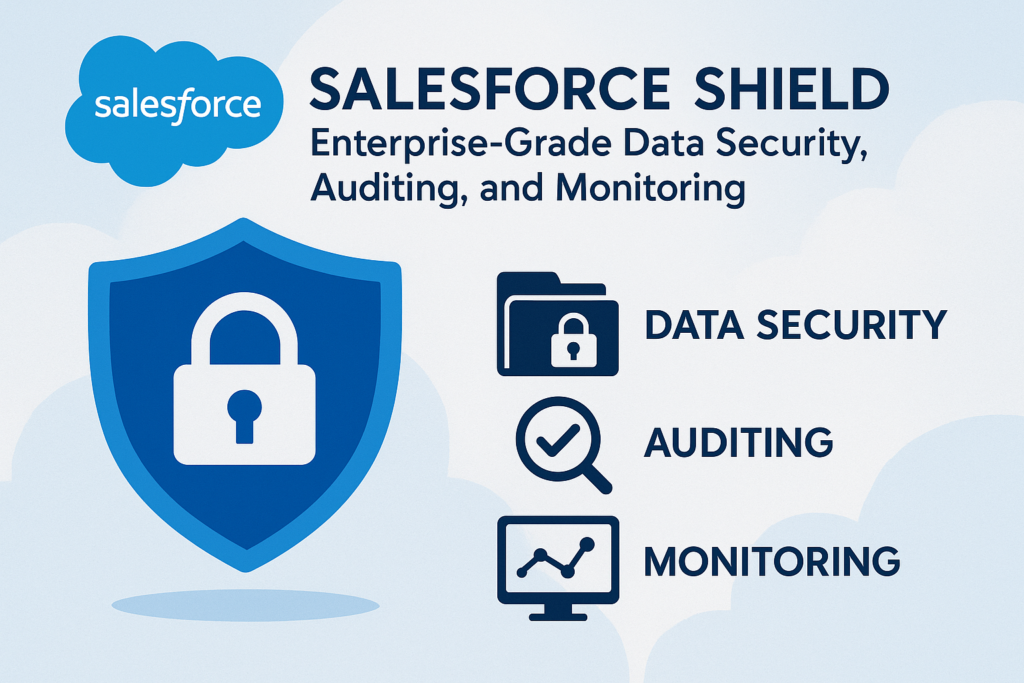Salesforce Shield: Enterprise-Grade Data Security, Auditing, and Monitoring
In today’s digital era, securing sensitive customer data and maintaining compliance is not just a best practice—it’s a business imperative. That’s where Salesforce Shield steps in. Tailored for highly regulated industries like finance, healthcare, and government, Salesforce Shield provides enhanced data protection, transparency, and control within your Salesforce environment.
What is Salesforce Shield?
Salesforce Shield is a suite of three security and compliance tools offered by Salesforce to help you protect your organization’s data at every layer. It extends Salesforce’s built-in security with:
- Platform Encryption
- Event Monitoring
- Field Audit Trail
Each of these components adds a powerful layer of protection and visibility across your Salesforce org.
Shield Components Explained
- Platform Encryption
Secure your sensitive data at rest using encryption keys managed by you. Unlike Classic encryption, Platform Encryption supports standard and custom fields, files, and attachments.
Key Features:
- Encrypt standard fields like Email, Phone, Text, etc.
- Support for BYOK (Bring Your Own Key) and Customer-Controlled Keys.
- Works with reports, search, and workflows without impacting performance.
Real Use Case:
A financial services firm uses Platform Encryption to encrypt client SSNs, financial account data, and emails to meet data protection laws like GDPR or HIPAA.
- Event Monitoring
Gain real-time visibility into user activity and potential insider threats with Event Monitoring. It logs over 50 types of events, such as logins, API calls, and record views.
Key Features:
- Detect suspicious behavior (e.g., mass downloads).
- Monitor API usage, logins, and Lightning usage patterns.
- Integrate with SIEM tools like Splunk or Elasticsearch.
Real Use Case:
A government agency uses Event Monitoring to track access to confidential records and integrate logs into Splunk for anomaly detection.
- Field Audit Trail
Maintain long-term history of field-level changes beyond Salesforce’s default 18-month limit. Track up to 10 years of data changes across up to 60 fields per object.
Key Features:
- Up to 10 years of audit data retention.
- Track changes even after data is deleted or updated.
- Ensure data integrity and compliance.
Real Use Case:
A healthcare provider uses Field Audit Trail to keep historical records of patient information and treatment history for legal compliance.
Flow of Shield Components
Salesforce Shield works in tandem with standard Salesforce features. Here’s a simple flow:
- Platform Encryption secures data at rest.
- Field Audit Trail tracks what changed and when.
- Event Monitoring logs who accessed or changed the data.
This combination gives organizations full control over data visibility, behavior tracking, and regulatory compliance.
Demo Setup: Step-by-Step (Example for Platform Encryption)
Step 1: Enable Shield via Salesforce Support or License
Ensure you have a Shield-enabled org (contact Salesforce for trial access if needed).
Step 2: Go to Setup → Platform Encryption
Enable encryption for required fields (e.g., Email on Contact).
Step 3: Generate Tenant Secrets
Choose between:
- Salesforce-Generated Keys
- Bring Your Own Key (BYOK)
- Cache-Only Key Management
Step 4: Encrypt Data
Select standard/custom fields and encrypt them.
Step 5: Test
Try to export encrypted fields or use them in reports to validate encryption impact.
Key Management Options Explained
| Option | Description | Use Case |
| Salesforce-Generated | Auto-generated and managed by Salesforce. | General use cases |
| BYOK | Upload your own key from HSM or external provider. | High-security environments |
| Cache-Only | Key stays in memory (RAM), not persisted on disk. | Maximum protection, high-risk data |
Benefits of Using Salesforce Shield
- Meet compliance standards: GDPR, HIPAA, CCPA, FINRA, etc.
- Enhance internal security policies.
- Enable proactive threat detection.
- Retain data history for audits and investigations.
- Control and monitor user behavior effectively.
When Should You Use Salesforce Shield?
Use Salesforce Shield when your business:
- Handles PII, financial, or healthcare data.
- Requires audit logs for compliance.
- Needs extended field history beyond default limits.
- Has strict internal or external regulatory requirements.
Conclusion
Salesforce Shield offers the data security trifecta your organization needs: Encryption, Monitoring, and Auditing. Whether you’re handling financial transactions, managing health records, or dealing with government documents, Shield ensures your data stays secure, traceable, and compliant.
Bonus: Try Salesforce Shield with a Free Trial
To explore Shield features in your sandbox:
- Request access via Salesforce Help Portal
- Or contact your Salesforce Account Executive for a Shield demo/trial license.

